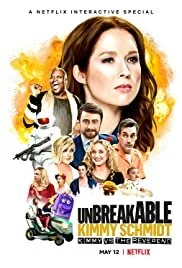Director: Claire Scanlon
Cast: Ellie Kemper, Tituss Burgess, Carol Kane, Daniel Radcliffe
Have I Seen it Before: Nope. It’s a brand new but anticipated thing, which is a strange thing to have these days. Aside from still wanting to see No Time To Die and the increasing likelihood that The New Mutants will one day become The Day The Cried Clown of modern cinema, wanting to see a forthcoming movie feel like something from the before times.
Did I Like It: Now, that that is out of the way, it is almost impossible for this review to not take two different paths. How clever of me.
Does it work as a coda for the series? Yes, I would even dare to say more effectively than the last proper season managed. Finally bringing Kimmy (Kemper) face to face with the Reverend (Jon Hamm) and giving her the opportunity to stoop to his level—if righteously—or embrace the optimism that made her unbreakable in the first place was far more satisfying than making all of the characters successful in their careers and financially stable. One might take this opportunity to note that the proceedings are just as funny as the show’s first, superlative season.
There are plenty of more additional notes for the other characters to reach. If you play the story correctly (and there is a correct way, more on that later) Titus (Burgess) evolves ever so slightly past his self-absorption, becoming a better friend, an accidentally more professional actor and eats less dirt, while Jacqueline (Jane Krakowski) never has to confront a lie and avoids accidentally negating the entire #metoo movement. Everyone who might deserve a happy ending gets one, and the Reverend eats it with or without Kimmy’s vengeance.
Which is the only complaint I might have. Since I’ve done a little bit of work in the genre, I can say that the choose-your-own-adventure branching storyline doesn’t work nearly as well as it could have. There is really only one path that the story can take, and any deviation from that path invites disaster. Had there been two distinct storylines that the viewer decides on in the early proceedings, maybe each path would be shorter than what we’re presented with, but there would have been more satisfying avenues of exploration.
Also, the conceit of a branching story like this presupposes that the viewer is able to make choices for the story, not control the realities of the story. At one decision point, the viewer is able to decide whether or not Titus actually does know “Freebird” before he takes the stage at a bar, or merely thinks he knows it. Two different bits follow, which is fine, but contemplating the reality that he both knows and doesn’t know the song before that point in time is enough to give Schrödinger a headache. The more I type this, the more I wonder if I dislike or love that different sensibility. One, you are in control of the character, but here it is as if you are part of the writing staff of the show, which is about as good a fantasy as I can think of.

